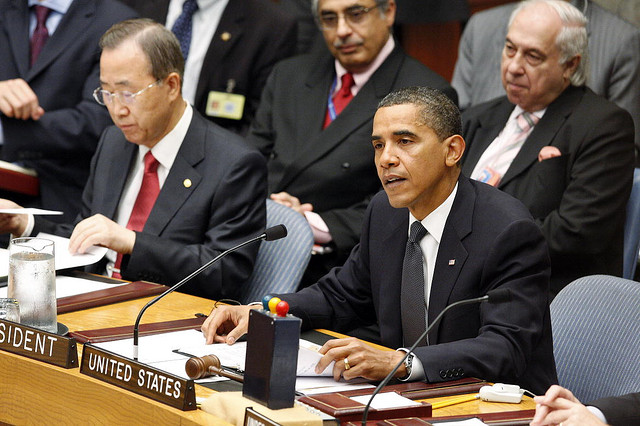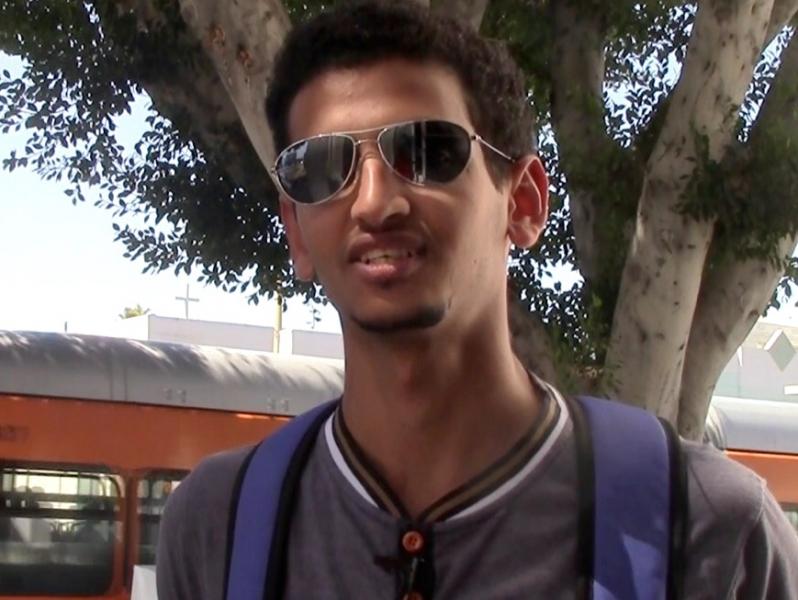President Obama At A 'Crossroads' About ISIS
At the United Nations in New York, President Obama took to the podium Wednesday, to outline his mission to "degrade" the Islamic State of Iraq and the Levant (ISIL).

It was the president’s second opportunity to chair a U.N. Security Council, the first having been a session on nuclear proliferation in 2009. Before this week’s U.N. General Assembly, there had been only five prior occasions on which the Security Council had met at an executive level.
President Obama began his speech by describing his and his colleagues’ position as being at a “crossroads” between war and peace.
The speech dealt with few facts, as the president’s rhetoric soared over many of the pressing issues being discussed this week. Among other topics, he touched on the Ebola crisis sweeping West Africa, and also reserved some criticism for Russia.
Vladimir Putin, he said, had given up the pretence of pro-separatism and was now openly moving troops across the Ukrainian border. Not for the first time, Obama urged his counterpart to cooperate with the international community and leave Ukraine.
The bulk of his speech, however, focused on the Islamist terror groups which threaten the fragile stability of the Middle East.
“It is time for the world—especially Muslim communities—to explicitly, forcefully and consistently reject the ideology of organizations like al Qaeda and ISIL,” he said.
The speech impressed Salam Al-Marayati, president of the Muslim Public Affairs Council (MPAC).
“It was very good of the president to make the remarks involving how we as a country are united with other countries, including Muslim majority countries, in countering ISIL,” Al-Marayati said.
President Obama discussed youth and education under the broader heading of destroying Islamist extremism, but his lack of reference to facts worried Al-Marayati.
“If we’re going to be left with a Middle East that has tyranny, that is war-torn and has weak central government, that has rich governments sponsoring groups like ISIL, then we believe the problem of violent extremism will be with us for some time,” he said.
Al-Marayati referred to “question marks” over America’s foreign policy in the Middle East. These doubts were echoed by Karan Keith Agarwal, the director of training at the University of Southern California Model United Nations.

“There’s definitely merit in the war, but not even 25 percent of the U.N. has joined the coalition,” said Agarwal. “I find it hard to believe that we’re not going to have a situation like what we had in Iraq in 2003.”
Agarwal also commented on the president's diplomacy.
“[Obama] did a great job of not offending anyone who could possibly be watching the speech.”
According to Salam Al-Marayati, Obama's overtures on the global Muslim community are not matched by his government’s relationship with American Muslims.
“The local government, other than law enforcement, is disengaged from our community. The president has yet to meet with American Muslim leaders.”
Al-Marayati went on, criticizing the media’s role in portraying American Muslims as a monolithic whole.
“There's definitely a lack of nuance in terms of covering Muslim communities.”
After he finished his lunchtime prayers at the Islamic Center Of Southern California on South Vermont Avenue, Saeed Alzaharni used words to the same effect.
“Muslim extremists are not part of the Muslim religion. American citizens, they just listen to the media,” he said.

Wednesday’s speech accompanied U.N. Security Council Resolution 2178 on Foreign Terrorist Fighters which the commander-in-chief himself brought forward.
Aside from commissioning a U.N. report on Foreign Terrorist Fighters (FTFs) within 180 days and strengthening Interpol’s (and other U.N. organizations’) restrictions, the resolution brings forth few, if any, plans which extend to numbers and specific targets.
When asked for comment, the United States Mission to the United Nations pointed to their press release, which covers some of the main talking points.
The resolution aims at few tangible targets, aside from establishing the definition of FTFs as “individuals who travel to a State other than their States of residence or nationality for the purpose of the perpetration, planning, or preparation of or participation in terrorist acts.”
Karan Keith Agarwal said that “[the president is] going to be out of office soon and we could see a major foreign policy shift.”
Just as Obama described his standing at the crossroads of “fear and hope,” it is unclear where Wednesday’s speech lies on the road between poetry and reality.



